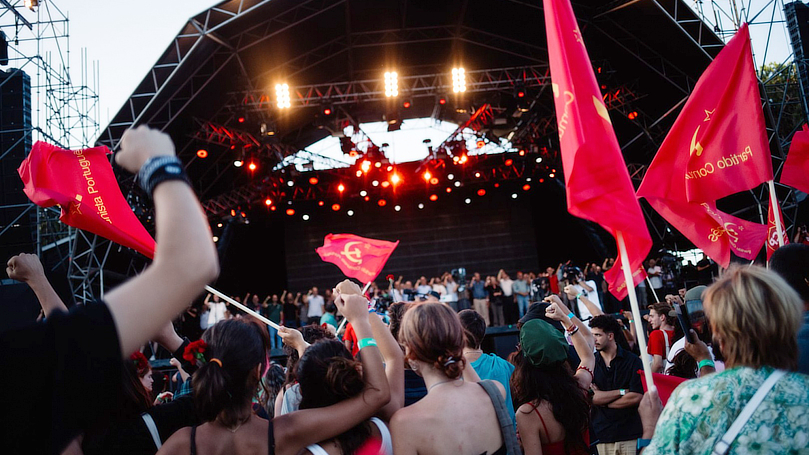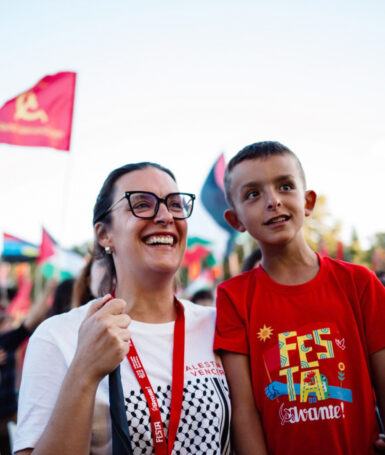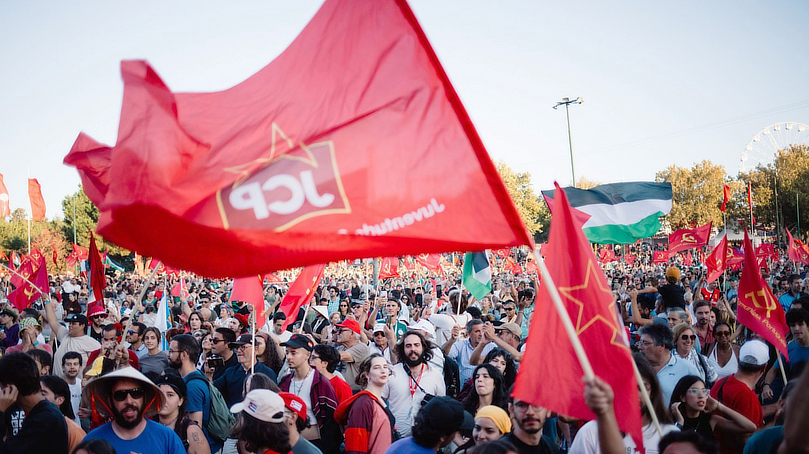
This year’s Festa Avante, sponsored by the Communist Party of Portugal (PCP) took place in Lisbon from September 6–9. Festa Avante, or Avante Festival, is a cultural event that brings thousands of communists and non-communists together to listen to music, participate in a wide variety of sports and arts events, and celebrate the foods of Portugal. There was a book fair, youth participating in martial arts exhibitions, and more. The festival has been running since 1976, soon after the Carnation Revolution of 1974, symbols of which were pervasive throughout the festival grounds. One woman who had lived through the fascist period and the Carnation Revolution wove little red carnations out of yarn to offer as gifts to people. She was kind enough to share one with us.
The festival is staffed completely by Communist Party of Portugal (PCP) activist and ally volunteers. Comrades from each area of the country — one of the oldest countries in the world — had booths from which to sell foods of their area as a fundraiser for the PCP. Portuguese foods vary by region, with choco (cuttlefish) being a national dish.
 There were sports events for the youth, including a wading pool for toddlers, and other physical activities. There were live concerts on the main stage that were amazing, including Bia Ferreira, a talented Brazilian singer, musician, and songwriter who packs progressive political messages into some of her songs. Her music can be found on streaming services, but the recordings don’t capture the energy and demand for change that made her concert leap off the stage and into the hearts of the comrades watching and listening. Ana Tijoux was another wonderful singer who performed.
There were sports events for the youth, including a wading pool for toddlers, and other physical activities. There were live concerts on the main stage that were amazing, including Bia Ferreira, a talented Brazilian singer, musician, and songwriter who packs progressive political messages into some of her songs. Her music can be found on streaming services, but the recordings don’t capture the energy and demand for change that made her concert leap off the stage and into the hearts of the comrades watching and listening. Ana Tijoux was another wonderful singer who performed.
Festa Avante included a less visible but very present meeting of delegates from forty-seven Communist parties, integrated quietly into the larger festival. Each party was welcomed by the PCP General Secretary. Bilateral meetings were held with the PCP, and the parties were also organized into “debates” — which we would call forums — to promote dialogue.
The “debate” format brings together a group of three or four parties to make short presentations and take questions. The Communist Party USA was paired with the Communist Party of Belarus and a member of the PCP who had been the head of the largest federation of labor unions in Portugal. Most of the questions from the floor were directed to the CPUSA regarding imperialism and racism, and how to fight both. In summary, the answer given was that imperialism in the U.S. can be defeated by building mass movements to demand moving the money from the military budget to meet social needs, while building a massive solidarity movement standing with working people globally against war and exploitation.
The struggle against racism is a component of that anti-imperialist struggle since imperialists use racism and xenophobia to justify their inhuman cruelty for profit. Anti-racism is a component of every struggle in the U.S. It is used to divide the working class as a means of weakening the fightback against exploitation and war. Racism can be met head on in practice by being very intentional about how a party organizes to fight for inclusion and leadership of oppressed peoples and women.
There was a welcome gathering in a comfortable patio behind the PCP school where Paulo Raimundo, General Secretary of the PCP, stopped by to say hello and to shake hands. In his welcoming speech, Raimundo mentioned the importance of fighting for unity in the struggle against facism, and for peace.
In their bilateral meeting with the PCP leadership, CPUSA delegates met with Jaime Toga, a member of the PCP Politburo. In that discussion, it was highlighted that “convergence” is an important need today, where each party defines their own path, understanding, national struggle, and international relations, while understanding that capitalism is fundamentally aggressive and must destroy countries and the working class. The PCP wants to pursue unified action, including struggles around equality, mutual respect, solidarity, and non-interference, and the struggle against fascism. There is a strong role for advancing socialism within those struggles, and convergence of unions with women’s, student, and other movements is vital in the anti-fascist struggle. Peace is seen as an antithesis of fascism, and as a fundamental element of unity. The focus of “convergence” is to bring all the anti-fascist and people’s forces into a common struggle.
The PCP’s focus on defending the Portuguese Constitution and the United Nations Declaration of Human Rights expresses a movement that is built on what was already agreed on. The Portuguese Constitution, for example, is explicit in forbidding fascism. While understanding the limitations of capitalist freedoms, fighting for those freedoms is an important part of building for socialism. When we struggle in the United States, a part of that struggle is defending the constitution, which is under attack from fascist forces. Defending the constitution today is important in order to build on it tomorrow.

There is a focus on building a culture of peace in the PCP. Because capitalism is so inhumane and violent in nature, a culture of peace reflects socialist ideals. Fighting for that culture within a capitalist context is one of the tasks of the Avante festival; reminding people of what can be. There were ample examples of this at the festival, including booths with foods from different parts of Portugal and the world. All sectors of society can support peace.
The festival culminates in a rally. Portuguese youth bring an uplifting energy, dancing and waving PCP flags to key songs like the PCP anthem and the Internationale. Paulo Raimundo said, “Here are those who don’t cave in the struggle for a better world.”
Raimundo assured the delegates they “have the solidarity of the PCP in this common struggle for the rights and aspirations of our peoples. They have the PCP’s commitment to strengthen the international communist and revolutionary movement and to broaden the anti-imperialist front.”
Affirming the PCP’s solidarity with the people of Palestine, Cuba, Venezuela, Saharawi, and others in their struggles for national liberation, Raimundo noted, “At a time when the U.S. and other capitalist powers do not hesitate to use their armed wing, NATO, or fascism to intensify their provocations, blackmail, sanctions, blockades, interference, coups and wars …we affirm and defend peace and fight those who make of death and destruction a guarantee of profit for the arms industry. We are not dragged into the propaganda of war, hate speech, and militarism. We do not give up – yes to Peace, no to war.”
Images: Rally of the Avante! Festival24 by PCP (pcp.pt)


 Join Now
Join Now